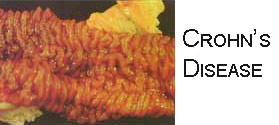


Overveiw
Crohn's disease, also known as granulomatous enteritis and colitis, is an inflammatory disease of the intestines that may affect any part of the gastrointestinal tract from mouth toanus, causing a wide variety of symptoms. It primarily causes abdominal pain, diarrhea(which may be bloody if inflammation is at its worst), vomiting, or weight loss, but may also cause complications outside of the gastrointestinal tract such as rashes, arthritis, inflammation of the eye, tiredness, and lack of concentration.
Crohn's disease is thought to be an autoimmune disease, in which the body's immune system attacks the gastrointestinal tract, causing inflammation; it is classified as a type of inflammatory bowel disease. There has been evidence of a genetic link to Crohn's disease, putting individuals with siblings afflicted with the disease at higher risk
It is understood to have a large environmental component as evidenced by the higher number of cases in western industrialized nations. Males and females are equally affected. Smokers are three times more likely to develop Crohn's disease.
What is Crohn's disease?
Top
 Crohn's disease is one of the inflammatory bowel diseases (the others include ulcerative colitis and irritable bowel syndrome) that causes ongoing inflammation of the intestinal tract. It primarily causes ulcerations of the small and large intestines, but can affect the digestive system anywhere from the mouth to the anus but it most commonly affects the lower part of the small intestine, called the ileum. The swelling extends deep into the lining of the affected organ. The swelling can cause pain and can make the intestines empty frequently, resulting in diarrhea.
Crohn's disease is one of the inflammatory bowel diseases (the others include ulcerative colitis and irritable bowel syndrome) that causes ongoing inflammation of the intestinal tract. It primarily causes ulcerations of the small and large intestines, but can affect the digestive system anywhere from the mouth to the anus but it most commonly affects the lower part of the small intestine, called the ileum. The swelling extends deep into the lining of the affected organ. The swelling can cause pain and can make the intestines empty frequently, resulting in diarrhea.
What Causes Crohns Disease?
Top
The cause of Crohn's disease is unknown. Some scientists suspect that infection by certain bacteria, such as strains of mycobacterium, may be the cause of Crohn's disease. To date, however, there has been no convincing evidence that the disease is caused by infection. Crohn's disease is not contagious. Although diet may affect the symptoms in patients with Crohn's disease, it is unlikely that diet is responsible for the disease.
Risk Factors:
Risk Factors:
- Being of Jewish heritage (three to six times more likely than the general population)
- Being of European (particularly Scandinavian) ancestry
- Family history of inflammatory bowel disease
- Cigarette smoking
- Living in an industrialized country (particularly an urban area)
- Eating a diet high in sugar and saturated fat and low in fruit and vegetables.
What Are the Sign/s And Symptoms of crohn’s disease?
Top
The most common symptoms of Crohn’s disease are abdominal pain, often in the lower right area, and diarrhea. Children with Crohn’s disease may suffer delayed development and stunted growth. The range and severity of symptoms varies.
- Diarrhea (with or without blood)
- Abdominal pain and bloating
- Fatigue
- Poor appetite
- Weight loss
- Fever
- Nausea and vomiting
- Floating stools (caused by poor digestion of fat)
- Rectal bleeding which may lead to anemia.
- Arthritis,
- Skin problems, Crohn's disease can also be associated with other medical conditions, including arthritis, osteoporosis, eye infections, blood clots, liver disease, and skin rashes.
How is Crohn's disease different from ulcerative colitis?
Top
While ulcerative colitis causes inflammation only in the colon (colitis) and/or the rectum (proctitis), Crohn's disease may cause inflammation in the colon, rectum, small intestine (jejunum and ileum), and, occasionally, even the stomach, mouth, and esophagus.
The patterns of inflammation in Crohn's disease are different from ulcerative colitis. Except in the most severe cases, the inflammation of ulcerative colitis tends to involve the superficial layers of the inner lining of the bowel. The inflammation also tends to be diffuse and uniform. (All of the lining in the affected segment of the intestine is inflamed.) Unlike ulcerative colitis, the inflammation of Crohn's disease is concentrated in some areas more than others and involves layers of the bowel that are deeper than the superficial inner layers. Therefore, the affected segment(s) of bowel in Crohn's disease often is studded with deeper ulcers with normal lining between these ulcers.
What are the complications of Crohn's disease?
Top
Complications of Crohn's disease may be related or unrelated to the inflammation within the intestine (such as intestinal or extra-intestinal).
Intestinal Complications may include
Relieves Symptoms like:
Crohn’s disease usually manifests with exuberating episodes, homoeopathic medicines help by increasing the time between these episodes.
Controlling and reversing the underlying Disease process:
Homoeopathic medicines have proven their efficacy in all sought of Inflammatory Bowel conditions and help by reducing the inflammation & ulcerations and helping in restoring intestinal functions back to normal. It also helps by enhancing ones immune response. If homoeopathic treatment is sought early it helps in preventing the progress of disease and preventing any complications (Skin, Liver, and Arthritis) from occurring, which are usually associated with the disease. It helps by reducing the ulcerations at first and over a period of time by healing them. We at DRSS provide our patients with diet charts, exercise schedules and guide them how to modify their lifestyle so that better results can be achieved. Our medicines can be started with conventional treatment depending upon the disease state and case. Homoeopathic medications if taken under proper guidance and care from a qualified homoeopathic practitioner have no side effects.
- Obstruction and perforation of the small intestine,
- Abscesses (collections of pus),
- Fistulae,
- Intestinal bleeding.
- Massive distention or dilatation of the colon
- Increase risk of cancer of the small intestine and colon in patients with long-standing Crohn's disease. Extra-intestinal complications involve
- Skin Complications: painful red raised spots on the legs (erythema nodosum) and an ulcerating skin condition generally found around the ankles called pyoderma gangrenosum.
- Eye: Painful eye conditions (uveitis, episcleritis) can cause visual difficulties.
- Arthritis: Pain, swelling, and stiffness of the joints of the extremities. Inflammation of the low back (sacroiliac joint arthritis) and of the spine (ankylosing spondylitis) can cause pain and stiffness of the spine.
- Liver: Inflammation of the liver (hepatitis) or bile ducts (primary sclerosing cholangitis) causing narrowing and obstruction of the ducts draining the liver and can lead to yellow skin (jaundice).
Relieves Symptoms like:
- Diarrhea
- Abdominal pain and bloating
- Fatigue
- Poor appetite
- Weight loss
- Fever
- Nausea and vomiting
- Floating stools (caused by poor digestion of fat)
- Rectal bleeding which may lead to anemia.
- Arthritis,
- Skin problems,
Crohn’s disease usually manifests with exuberating episodes, homoeopathic medicines help by increasing the time between these episodes.
Controlling and reversing the underlying Disease process:
Homoeopathic medicines have proven their efficacy in all sought of Inflammatory Bowel conditions and help by reducing the inflammation & ulcerations and helping in restoring intestinal functions back to normal. It also helps by enhancing ones immune response. If homoeopathic treatment is sought early it helps in preventing the progress of disease and preventing any complications (Skin, Liver, and Arthritis) from occurring, which are usually associated with the disease. It helps by reducing the ulcerations at first and over a period of time by healing them. We at DRSS provide our patients with diet charts, exercise schedules and guide them how to modify their lifestyle so that better results can be achieved. Our medicines can be started with conventional treatment depending upon the disease state and case. Homoeopathic medications if taken under proper guidance and care from a qualified homoeopathic practitioner have no side effects.

Crohn's Disease




